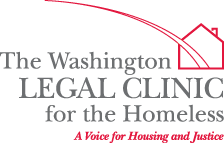The work of the Legal Clinic began in the 1980s, as many in the United States took increasing notice of homelessness. At that time, a group of lawyers in DC were spurred to form a model for providing direct, no-barrier legal services to unhoused residents – thus laying the foundation for the Washington Legal Clinic for the Homeless. We carry on that work today in a DC where not only has homelessness not been solved, but it has been fueled by a severe loss of affordable housing. Our housing justice work has expanded and today takes place in the context of a District of Columbia that became one of the epicenters of gentrification in the United States, where residents face crisis levels of housing unaffordability and displacement – with at least 20,000 Black DC residents being displaced between 2000 and 2013.
At the Legal Clinic we strive to ground our advocacy in lessons learned through direct representation and organizing efforts with community members impacted by housing and economic insecurity. This has led us to deepen our work around the issue of how land use impacts housing instability and homelessness. Since May 2017, we have been actively involved in the current amendment cycle for Washington, DC’s Comprehensive Plan, work that has largely taken place through the DC Grassroots Planning Coalition, in which Legal Clinic attorney Caitlin Cocilova serves as a Steering Committee member. DC’s Comprehensive Plan is a 1500+ page document that anticipates and guides future development decisions over a 20-year period. The Comp Plan includes “Citywide Elements” that cover the entirety of DC (i.e., housing, economic development, transportation), “Area Elements” that are specific to smaller geographic areas within the District, and maps that dictate what could be built or created on a particular plot of land.
The Mayor of Washington, DC (our local executive branch) is legally mandated to oversee planning processes in the District and must amend, or update, the 20-year plan every four years before a complete rewriting of the document. DC’s Office of Planning generally handles this process. DC Council (our local legislative branch) can then approve or alter whatever the Mayor’s Office of Planning proposes in terms of changes to the Comp Plan. This process must include opportunities for public input.
As the guide for planning and development in DC, the Comprehensive Plan impacts all DC residents. When a developer proposes to build something different than what is automatically allowed by the zoning designations on a particular parcel of land, the proposed project still must legally “not be inconsistent with the Comprehensive Plan.” The Zoning Commission must review the Comp Plan provisions and make sure that any proposed project is in line with the planning document. This means that the language and maps in the Comp Plan – much of which has been molded over many years by affected and engaged residents – serve as a check on new projects that could otherwise cause harm to their communities in the way of, for example, environmental impacts or displacement.
The Legal Clinic, as a part of the DC Grassroots Planning Coalition, has continued to analyze the document’s ability to provide equity in practice, not just in rhetoric, and to prevent displacement. We have testified at DC Council hearings on the Mayor’s proposed changes to the Plan and helped plan and conduct monthly presentations alongside other Coalition members and groups to foster dialogue and a better understanding of this huge document.
We are concerned that the proposed amendments to the Comprehensive Plan, released by the Office of Planning in April of 2020, do not adequately address DC’s ongoing housing crisis and the continued displacement of low-income Black and brown residents. We thus support the Housing Justice Priorities put forth by the DC Grassroots Planning Coalition as a productive start to better planning practices in DC.
The impacts of development and planning practices on DC residents who are unhoused or housing insecure require immediate and strong policy responses. As Caitlin stated in her December 2020 testimony submitted to the DC Council on the Comprehensive Plan:
The way we have seen the growth of DC most intimately impact our clients has been by increased, sometimes permanent, encampment sweeps in gentrifying neighborhoods due to complaints on neighborhood listservs (ex. NoMa) and cases of clients discriminated against when attempting to access Class A apartments using vouchers. We have few cases of clients with vouchers, including rapid rehousing, who have been able to access any of the many new builds. Even if Council believes in supply and demand theory – the idea that building more housing to meet a growing demand will reduce housing costs and allow for people with lower incomes to access the housing market presumably without a voucher – how long do we wait for the tipping point to occur that causes housing costs to decline?
The results we see today, of people in high numbers doubled up, in shelters, on the street, and in temporary housing programs, are the consequences of planning that has failed to include their needs. Public planning and policy that has allowed for such injustice must be corrected. We echo the call in the DC Grassroots Planning Coalition’s Housing Justice Priorities: DC’s Comprehensive Plan would be strengthened by adding policies and actions that fortify existing affordable housing programs and require community-led equitable development strategies that further racial equity.





